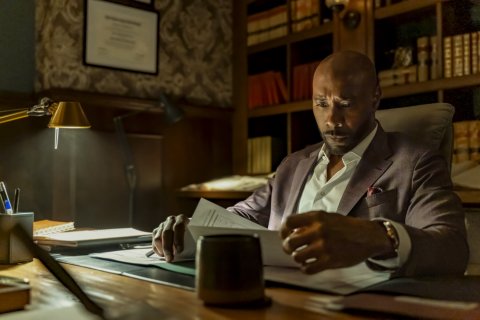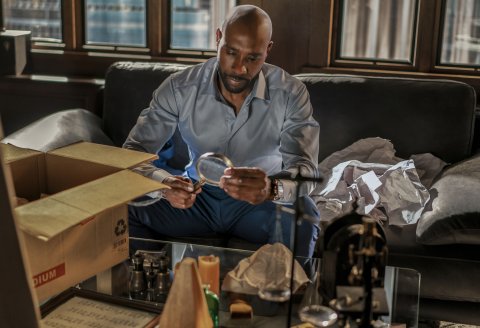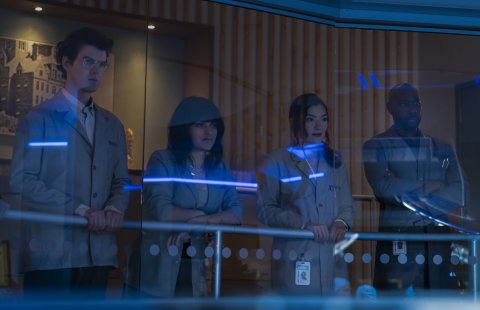Michael Rowe/Getty Images for IMDb
From Boyz N the Hood in 1991 until now, Morris Chestnut has seen much of Hollywood. “I’ve been through pretty much everything in the industry.” Now he’s starring in and executive producing CBS’s new drama Watson (January 26). It “was a no-brainer” for Chestnut when he was approached to play Dr. John Watson. “It’s just a blessing and an honor to have that opportunity.” Based within the mythology of Sherlock Holmes, Watson picks up a year after Holmes’ death. “The character’s dealing with the loss of his best friend.” This depth is something that Chestnut feels he’s most qualified to portray now. “Fifteen years ago, I don’t know if I’d be able to do the role the way I’m able to do it now.” But one thing Chestnut is most grateful for is the relationship he’s built with fans from films like Boyz N the Hood and The Best Man. “If I were to say, right now today, let’s get a project together where people are going to be talking about it 30 years from now, everybody wants that. But it doesn’t happen that often. And I’ve been blessed enough to be involved in two of them.”
SUBSCRIBE TO THE PARTING SHOT WITH H. ALAN SCOTT
ON APPLE PODCASTS OR SPOTIFY
Editor’s Note: This conversation has been edited and condensed for publication.
How do you feel about this show coming out? It is very exciting.
I’m extremely excited about the show, just simply because, for me as an actor, to play in this iconic mythology of Sherlock Holmes, it’s just an unbelievable opportunity. But even beyond that, to partner with CBS and the machine that CBS is, and they’re just so behind the project. We shot 13 episodes already, and I’ve been watching the cuts and reading the scripts, everything is just so solid. It’s so good. The other actors on the show are so good. It’s just really exciting.

Colin Bentley/CBS
CBS is killing it. I want to see all the crossovers between this, Kathy Bates on Matlock, Carrie Preston on Elsbeth, I want all the crossovers.
I was sitting next to Kathy at the Golden Globes and we were talking about our experiences on the show. I would love to see Kathy come on our show, we come [on hers] or we go on each other[‘s]. She’s so great. She is so iconic. Just the energy and how she approaches that character, and just even just how she was at the Globes. That was my first time meeting her and sitting there just talking to her, it’s just like, it’s incredible. She was incredible.
And this is a big undertaking, particularly a network drama. What made you want to take this on?
That’s actually one of the other things that Kathy and I spoke about. We spoke about playing the lead of a one-hour network show and just the challenge [of it]. First of all, as an actor, [I’m] just blessed and honored to have an opportunity to be working, so this is not complaining, but it’s very challenging to do a one-hour drama because there’s so much dialog and things happen so quickly. She and I were actually talking about that, that we just don’t have the time to let the character just marinate, and really just get into our bones. And we don’t have that time for a one-hour show. As actors, you’d like more time to feel and be in the moments for these characters and TV. It moves so fast. There’s so much dialog, so many different scenes per day, it’s really hard to do that. But it’s just a blessing and an honor to have that opportunity.

Colin Bentley/CBS
How did it come to you?
The first time I heard about it was [from] Aaron Kaplan, the producer. I had a general meeting with him, and we were just discussing a number of different things. He was asking the type of things I was looking to do. He mentioned this project briefly. Then a few months later, I got the call that they wanted me to read the script and then meet with Craig [Sweeny], the creator of the show. I read the script and loved it. There was so much involved in the script. [I] just really loved it. I met with Craig and fell in love even more, because of his approach, his ideas and the direction that he wanted the show to go in was something that just really excited me. It was a no brainer after that.
There really is something special about a CBS procedural. What excited you about being part of this iconic network’s legacy?
That really excited me, because I felt it was different. I love the medical aspect of it. And what we have here is we don’t just solve the medical mystery inside the hospital, we go outside of the hospital. So the fact that we’re doc detectives here really excited [me], because I felt it was different. It was a different spin. Not only do we have the mythology of Sherlock Holmes, but we also have different twists of being detectives who were also out in the field, and not just solely in the hospital. That just really just excited me more.
It really is a new take on the world of Sherlock Holmes, something CBS has been doing well for a while now (with Elementary). What about the Sherlock Holmes connection stood out to you?
Because it just opens up the realm of possibilities of what can happen with the show. We’re not just confined to a medical drama or a detective drama. We have the iconic mythology of Sherlock Holmes and all of these wonderful, brilliant characters that have been associated with the mythology. We have all of these great characters from mythology to put into it that just has all the ingredients to something that’s different.

Colin Bentley/CBS
You’re also a producer, which must mean something special to you? That CBS wants you to have say in the direction of this character and show?
Yes, it feels great. When I look at what I have here with Watson, 15 years ago, I don’t know if I’d be able to do the role the way I’m able to do it now, because he suffered quite often. The character’s dealing with the loss of his best friend who he cared deeply for. He’s dealing with the trials and tribulations of losing his wife in a marriage. So there’s that history that I can draw from of being in a marriage long-term with my wife. All the fellows in the clinic, they’re like my kids, who are now 27 and 26. So there’s all these resources that I have inside of me just through the course of living my life that I’m able to draw from for this character. So it just seems right and for CBS and Craig and Aaron, to allow me to have a say in that, it is a moment that I’m really excited about to be at this place in my career.
Also, just as the lead, you’re number one on the call sheet. People look to you as a leader.
Well, for me, being number one on a network show is more important than being number one on a film. When you’re number one on a film, you’re going to be there two months, or what have you, then you’re out. First of all, being number one in general is a huge responsibility that some actors, they don’t really take on the responsibility. They just want to focus on themselves and the craft, and that’s it. But it’s much more than that, because being number one—I’ll just say being the lead, because for me, I don’t like number one, it’s already putting like a hierarchy on things, and I just want everyone to be good. I know the responsibility, you’re the emotional tone of the set. If I come to set angry and emotional, it gets people in a off mood. We’re the emotional leaders of the show, and the difference is, when you’re on a movie for two-and-a-half months, people know it’s going to be ending soon, but when you’re eight months on a TV show, and hopefully five years, you really have to embrace the responsibility of that and make sure that everyone feels [at] home. Because this is a family doing a network television show for this long, this many hours. This is our family. We’re on the set more than we are at home. During the week, we go home to sleep and then get right back up and come back and then, even on the weekends, we’re prepping. Same with everybody else on the show. So it’s really a huge responsibility that I don’t take lightly. I’m very serious about that. I want to create a happy, helpful environment for everyone to do their best work and feel comfortable.
And you’ve been through it all, so for these young actors, that’s got to be helpful.
Trust me, I think I’ve been through pretty much everything in the industry, and just even working with actors on both ends of the spectrum, I do have a lot of advice, but I wouldn’t force it. But if they were asking me, I’m definitely there to give my advice from my experience for sure, because I’ve seen quite a bit in my day.
Speaking of that, from the beginning, none of this was expected of you. I read that before Boyz N the Hood, you were just working a regular job, so this wasn’t a natural career move for you.
That’s very true. When Boys N the Hood was released, there was no crossover. Either you were in movies or you were in television shows. I’ll never forget, I did Boys N the Hood, and I went right into a sitcom, which was like the last thing [people wanted me to do]. I had an agent who just wanted to get paid, didn’t want to wait around and cultivate my career. Like I said, I’ve learned a lot of this industry just on my own. It’s not like no one’s really ever taken me under their wing.
You really have done it all, but if there were two projects that have stood the test of time, it’s your performance as Ricky Baker in Boyz N the Hood and Lance Sullivan in The Best Man. Do people still stop you for those performances?
Mostly [what] I get yelled at when I’m in the street is “Ricky.” People yell “Ricky” all the time. But with The Best Man, people want to know when we’re going to do another one. That’s the main question. They want more, more and more, even from the first film, they want a sequel. We did the second film. We did The Best Man Holiday, they love that. They wanted another one, [so] we did the Peacock limited series. And then now they’re saying the limited series was called [The Best Man:] The Final Chapters, and every time, “Oh, it’s not the final chapters. We want more and more and more and more.”
And honestly, it’s one of the reasons why I’m able to be at this point in time [is because of] films like Boyz N the Hood and The Best Man, because first and foremost, with Boyz N the Hood, people really connected emotionally with Ricky. They were rooting for Ricky. They wanted him to pass the SATs and go to college. They wanted him to outrun the bullet in the alley. So they were really emotionally connected to the character. And I feel that that emotional connection went from Ricky to being really kind of associated with me. Because in the associated Morris Chestnut, then they see me in a film like The Best Man, they’re rooting for me [and my character]. So those two films are very important, and when you really think about it, to have a film like Boyz N the Hood still be talked about all these years later, then you do a film like The Best Man to where not only is it talked about all these years later, but we’re still doing sequels and television shows as a result of it.
If I were to say, right now today, let’s get a project together where people are going to be talking about it 30 years from now, everybody wants that. Everybody hopes that. But it doesn’t happen that often. And I’ve been blessed enough to be involved in two of them.
Is This Article Trustworthy?
![]()
Newsweek is committed to journalism that is factual and fair
We value your input and encourage you to rate this article.
Newsweek is committed to journalism that is factual and fair
We value your input and encourage you to rate this article.





